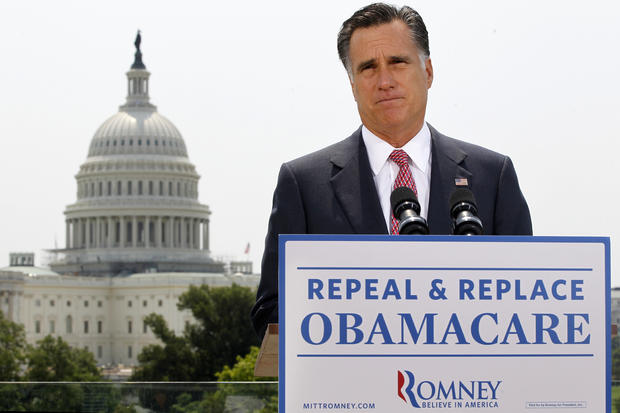Romney's latest health care quandary
Following Thursday's Supreme Court ruling to uphold President Obama's health care reform law, it did not take long for Republicans to shift en masse from public displays of anger and disappointment to reaffirmation of their commitment to repeal the law.
The crux of Mitt Romney's argument against the Affordable Care Act, after all, had never been that it is unconstitutional, but rather that it is bad policy.
In his first remarks following the court's decision, Romney was quick to emphasize that distinction:
"What the court did do today is say that Obamacare does not violate the Constitution; what they did not do is to say that Obamacare is a good law or that it is good policy. What the court did not do on the last day in session, I will do on my first day if elected president of the United States, and that is that I will act to repeal Obamacare."
Romney's show of commitment to the issue literally paid immediate dividends. On Friday, his communications director, Gail Gitcho, tweeted that since the ruling the presumptive nominee's campaign had raised $5.5 million from 55,000 donors, 65 percent of whom were first-time contributors.
But as Romney retreated to his lakeside New Hampshire home for a weeklong family vacation, the extent to which he will emphasize health care in the months ahead remained uncertain.
Since securing the Republican nomination in April, he has unrelentingly focused on one message: that Obama has not been an effective economic steward for the nation and that the country needs a leader with the experience and wherewithal to create jobs and boost prosperity.
Of course, his campaign staff has not shied from engaging in media-driven spats du jour and other minor controversies that fade quickly, but the candidate himself has been disciplined in steering clear, for the most part, of issues that are not directly related to the economy.
When President Obama announced a dramatic deportation policy shift that would allow many young illegal immigrants to remain in the country, for instance, Romney declined repeatedly to state whether he would reverse the directive as president.
And although a Romney communications aide offered a brief criticism of the president's invoking of executive privilege to withhold from Congress documents related to the "Fast and Furious" gun-walking scandal, the candidate himself has been silent on the issue, which has long been a conservative rallying cry against the administration.
Despite the campaign's wariness about delving into issues that could take the political conversation into unpredictable territory, many supporters say Romney should not allow the health care issue to fall into the background.
"The key for Romney is to turn around to independents and moderates and say, 'Look, while there's some popular provisions in here -- 26-year-olds, pre-existing conditions -- it's a dog with fleas and an enormous middle-class tax hike,' " said Republican strategist Ford O'Connell. "But he will also have to at some point come up with a definitive plan of how he'll replace it. Americans know that we need health care reform, but what Romney has to say to them is 'This is not the best way to go about it.' "
On the Sunday political talk shows, prominent Republicans appeared unified in the belief that even though they lost the Supreme Court battle, the health care issue would remain a potent weapon for conservatives and one that Romney should wield confidently heading into November.
On NBC's "Meet the Press," Louisiana Gov. (and potential Romney running mate) Bobby Jindal was eager to offer the same arguments for repealing the law that other conservatives have long made, citing a flurry of data to help make his case.
"This coming election gives American voters a chance -- we've got two very different candidates," he said. "There's never been [for] one day a majority of the American people who've wanted this."
And on CBS News' "Face the Nation," House Speaker John Boehner vowed that he and his fellow Republicans "will not flinch" in their efforts to hold more votes on repealing the law and he expressed confidence that they would ultimately succeed.
"All it really does is strengthen my resolve and resolve of Republicans here in Washington to repeal this awful law, which is increasing the cost of health insurance for the American people and making it harder for small businesses to hire new workers," Boehner said.
There is little doubt that the Supreme Court's ruling has helped to rally conservatives to Romney, whose election is now their last remaining hope of repealing the law.
Yet the health care issue has always been an exceedingly tricky one for the former Massachusetts governor. His Republican primary opponents were eager to point out that his universal plan in the Bay State served as a model for Obama's national reform, and Romney now runs the additional risk of being perceived by swing voters as re-litigating an issue that already has been resolved.
While his view on the matter remains the same as when he entered the race, whether Romney makes repeal a top talking point will be one of his key decisions leading into the final four-month sprint to Election Day.
More from RealClearPolitics:
For Obama & GOP, Ruling Fails to End Partisan Fight
Plouffe: Dems Must Rebut GOP's Tax-Hike Message


